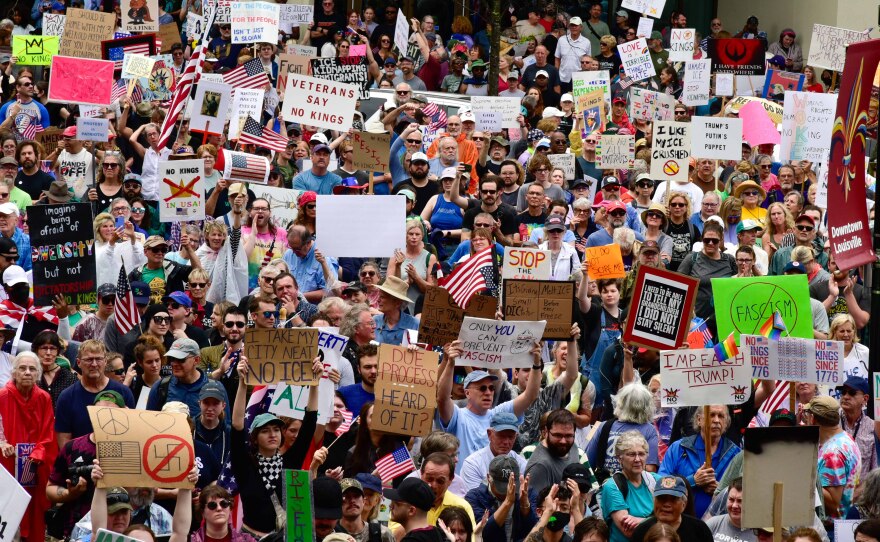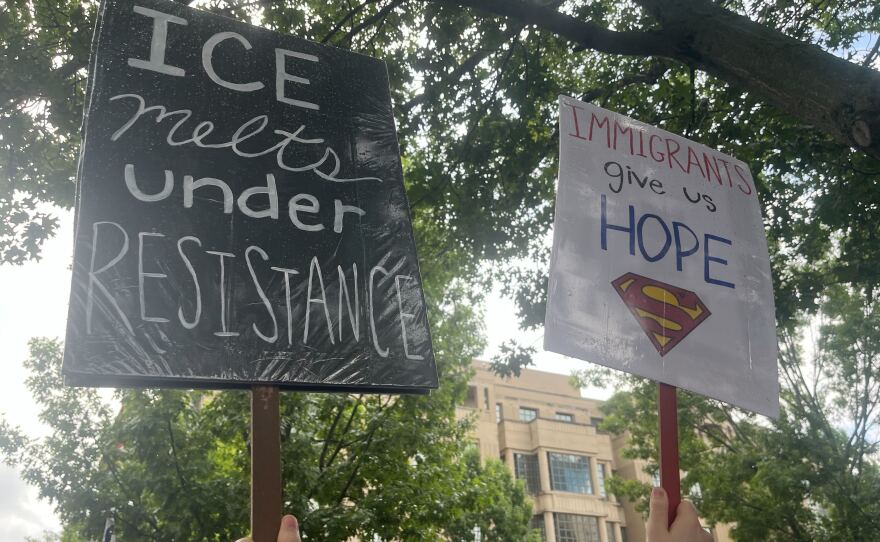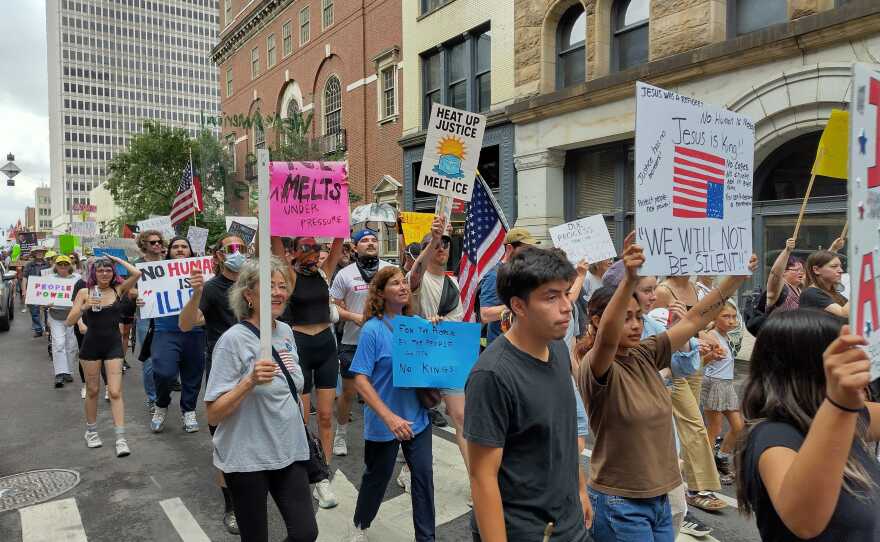Two hundred and fifty-one years after American colonists dumped tea into Boston harbor in defiance of the British monarchy, Kentuckians joined a nation in protest of a president holding a military parade on his birthday in Washington D.C.
The message remains: “No kings.”
More than a dozen cities in Kentucky planned rallies in coordination with more than 2,000 cities around the country in the nation’s largest protest against rising authoritarianism since Donald Trump took office in January, according to organizers with No Kings.
“We feel like we are very close to having a dictatorship… And democracy, it seems fragile right now, and that's never happened in our entire life, said Louisville protester and retired nurse Eddie Lueken. “We were really too young to protest at the Vietnam War. But we're not too young now. We're not quite too old.”
From Paducah to Ashland, Bowling Green to Louisville, thousands demonstrated in Kentucky on Saturday. They waved American flags and carried signs airing their grievances, of which, there are many.
“We're worried about people dying because of all the cuts, we're worried about civil rights, we're worried about our standing in the world. We're worried about Gaza and the horrible things going on over there,” Leuken said.
Louisville Public Media reporters estimate thousands of people arrived outside Metro Hall in Kentucky’s largest city. They heard from Kentucky’s only Democratic Congressman Morgan McGarvey and others, before marching through downtown.
The day of defiance was organized by democratic advocacy group Indivisible and a coalition of pro-democracy organizations to counter a massive military parade planned for Saturday evening in Washington D.C. on the 250th anniversary of the U.S. Army, and Trump’s 79th birthday. It will include thousands of soldiers, tanks, and military helicopters.
No Kings organizers canceled a planned protest in Minnesota after two Democratic lawmakers and their spouses were shot in politically motivated attacks on Saturday morning. Former Minnesota House Speaker Melissa Hortman and her spouse were shot and killed while Sen. John Hoffman and his wife were injured.
Bowling Green
In Bowling Green, an estimated 2,000 protesters marched chanting “No Trump, no KKK, no fascist USA.” That protest follows on the heels of another protest over the arrest of a Bowling Green teenager by federal immigration officials.
One protester, John Blake, is a Republican and voted for Trump in 2016. He was drawn to then-candidate Trump’s messaging of a political outsider who wanted to shake things up in Washington. Since then, Blake says he’s been disappointed to see the president, and his party, shift to ideals he says are centered around deceit and division.
“The Republican party, they’re unrecognizable. Especially if you look at Republican senators and people in the house who were so adamantly against Trump before he got elected. Now that he’s elected, they’ve kissed the ring, they’ve bowed down, because he is their king. He’s not my king, he’s my president. There’s a difference,” Blake said.
Throughout the march, Blake carried an American flag, folded military style and kept in a plastic case to protect from rain and damage. He said it was a symbol of a family legacy of fighting against authoritarian rule.
Lexington
Thousands of Lexingtonians protested in downtown Lexington on Saturday. The protest was scheduled to take place outside the Robert F. Stephens Courthouse, an area about a block long. The actual turnout ended up spanning several blocks downtown.
Many held signs and chanted along busy roads. Mae Scott is a physics professor who participated in the protests. She says she’s concerned about the federal claw back of research funds.
“A lot of the grants I like to participate in work on making physics a more diverse field… Most of the programs I'm aware of that have been supporting underrepresented students are getting defunded,” Scott said.
Many protested against the ramp-up of ICE raids and the deportation and detainment of immigrants under the administration. That includes Isaac Wink, who says it’s his first time protesting in Lexington.
“When you deport people with no due process, the only protection that anyone has anymore is whiteness, is race, is this idea that you look like what people think makes you an American,” Wink said.
Paducah
Despite the on-and-off bursts of rains, around 900 people lined the road outside of Bob Noble Park in Paducah. They chanted phrases like “this is what democracy looks like” and “no crowns, no thrones, oligarchs have got to go,” as dozens of cars driving by honked their horns in support of the rally.
Amanda Groves is an ordained minister within the Christian Church Disciples of Christ. She said she went to protest in Paducah because her faith calls her to “stand beside those who are being marginalized.”
“Cruelty is not who we are,” Groves said. “That is not God’s will. Anyone being above the law, that is not God’s will.” The crowd dwarfed the size of a counter protest set up across the four-lane road from the “No Kings” Paducah rally, where around 20 people held up flags in support of the president.
Demonstrators also lined the streets in places including Morehead and Shelbyville, holding signs saying “Congress can stop this” and “Democracy has no Kings.”
Peaceful Protests
Louisville Father and son Michael and Jacob Pauls say they’ve been showing up to protests in the city since February. Michael says he’s been driving around with a sign on the back of his car reading “What’s it going to take?”
“You can’t believe this stuff is happening in this country. It breaks your heart you know,” Michael said.
He argues it’s important that the protests remain peaceful.
“There’s people out here with kids,” he said. “This is amazing. Like I said, it’s good for my soul. Proud to be here.”
WEKU News Director Stan Ingold contributed to this story.
This story was produced by the Appalachia + Mid-South Newsroom, a collaboration between West Virginia Public Broadcasting, WPLN and WUOT in Tennessee, LPM, WEKU, WKMS and WKU in Kentucky and NPR.






















